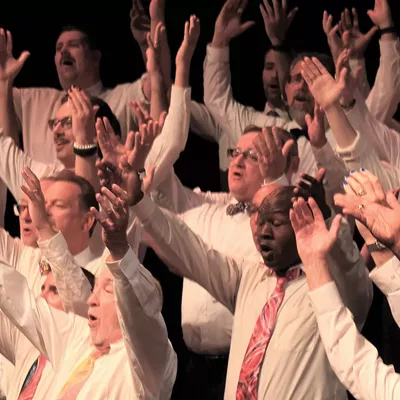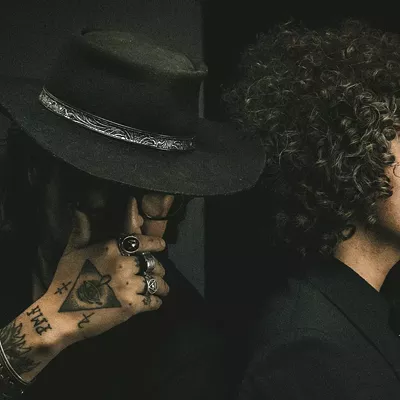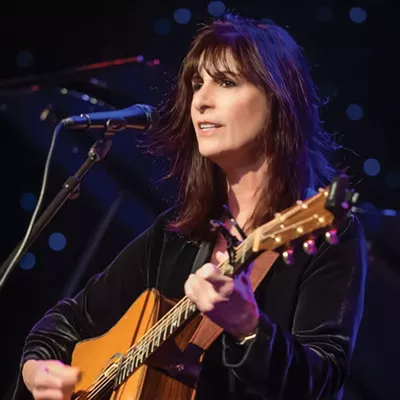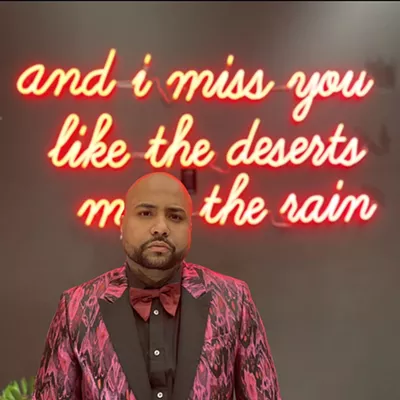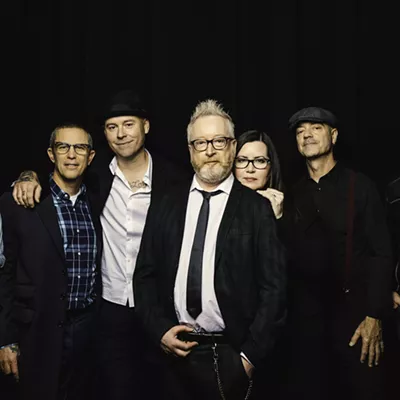Chelsea Wolfe likes to create music that emphasizes contrasts.
It's in that spirit that she describes her latest album, the most electronic to date of her eclectic career, as a "love letter to nature."
"It didn't really seem weird to me," she says.
"I like the idea of a song sounding light but the subject I'm singing about is very heavy, or the music is very heavy and there's something in the melody to lift it up a bit. To me, when my songs are very heavy, there's a sense of hope in there.
"Maybe it's just a contrast of something that's very modern and thinking about things that are very ancient."
On Pain Is Beauty, Wolfe sings about mythology, tradition and the complex relationship between humanity and nature.
"I think albums start to come together thematically for me. It's more that the ideas start coming together naturally," she says. "The album came together in concept and theme. It's all very elemental, songs about nature and ancestry and tormented love."
The themes for Pain Is Beauty first started poking into Wolfe's consciousness as she wrote "The Warden," a song that slowly emerges from a dark background of pulsing synths and drum beats. Wolfe's airily spooky vocals, singing of both the fragility and tenacity of love, balance the song's synthetic elements.
"It's sort of an abstract take on the hardships and torments of being in love and being strong for the person you're in love with," Wolfe says. "When I'm writing an album, I tend to fall into a mindset around the album. I tend to start thinking of similar themes. When I start thinking about those things, they start to make sense and relate together, and that's when I start pouring out songs and go from there."
Album opener "Feral Love" is in the same vein. Wolfe wrote the song as a response to a passage in D.H. Lawrence's Sons and Lovers, in which a character asks another if, in the past, the men of the woods were more afraid to go into the open space, or the men of the open spaces were more afraid to go into the woods.
"I started thinking about humanity in more of an early sense and thinking about love through the eyes of an animal, in a very instinctual way," she says. "It's a simple song about love and protection and fighting for your family and providing for the ones you love and the lengths you'll go to do that. I'm thinking about these herds of animals that travel hundreds of miles every year just to get a source of water. That struggle is reflected in humanity as well. I'm very interested in the relationship between nature and humanity.
"I feel like it's all within us. Even nature, I feel it's within us," she says. "I'm a big fan of Carl Sagan and he has a beautiful way of presenting science. One thing he's said in the past, 'We are made of the same stuff as stars.' There's this sense of connection to everything around us and that's how I start to think of other things being related."
The ideas that humanity is related to the Earth, that people are related to their ancestors, drove Wolfe's songwriting, but also exposed some of the disconnect in modern life. Wolfe explored a bit of her own family's history in Norway, but with estranged and far-flung families, it's hard to learn more specifics.
"One of the things I first stated thinking about is, as an American, it's strange that we're all living on this land that we're not really meant to be. It's not native to our ancestry for most people. Our families came from all over the world and basically stole this land," she says. "Maybe there's this sense of unrest in our personalities that comes from not being able to set our feet on the land our ancestors are from."
Pain Is Beauty is Wolfe's second album for Los Angeles-based label Sargent House, following Unknown Rooms: A Collection of Acoustic Songs. The leaps she makes sonically on the new record might be striking, but they're part of the plan she's had since her 2010 official debut, The Grime and the Glow. That and follow-up Apokalypsis established Wolfe's musical reputation as a sort of drone-metal-art-folk hybrid.
"I've pretty much jumped around from genres and within genres for the whole time I've been making music. I consider myself a folk singer basically because that's what I started as, singing and accompanying myself on guitar," she says. "But I always like to experiment with different sounds. Each album has a lot of different sounds within it. Even the last album, I tried to keep it mostly acoustic, but there were synths on it. I don't think I could ever really limit myself to one sound on an album."
Pain Is Beauty began as a writing project between Wolfe and bandmate/co-producer Ben Chisholm that was not intended for a Chelsea Wolfe record.
"A couple years ago I started writing these electronic songs and didn't really know where we were going to go with them, but they were fun to write," she says. "We even thought of doing it as a side project. But there's no reason to put limits on myself and say electronic songs have to go in a different band.
"Eventually we started incorporating them into the Chelsea Wolfe set and the album sprung from those songs. It was a new sound for me, something I hadn't experimented with before, and I just decided to write whatever songs felt right," she says.
Once those themes of ancestry, nature and love began intertwining in Wolfe's mind as a collection of songs, she was careful to match her words with the right sounds, stacking studio electronics on top of her skeletal demos, retaining those sparse and bleak moments as a way to emphasize the contrast in the songs.
"The recording process is always a long, slow, tedious process for me because I like to be involved in every aspect along the way. Since this is a new sound for me, I really took my time to make sure I liked the outcome," she says. "I spent a lot of time going back and forth between the newly recorded versions and the demos because I wanted to retain some of that raw quality."

